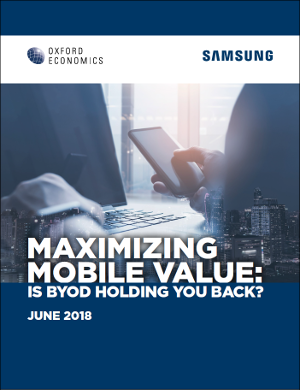Ungated Post | 13 Jun 2018
Maximizing Mobile Value: Is BYOD holding you back?

Mobile work is a strategic priority for many companies, but the fundamental decisions that enable it are too often based on short-term thinking and ad hoc policies.
To better understand the value of various approaches to device adoption, Oxford Economics worked with Samsung in early 2018 to survey 500 senior IT executives, CEOs, and other senior managers across the United States. We focused on the costs and benefits of different ways of providing mobile devices to workers, and on the goals companies have for their mobile efforts. Our research shows that up-front savings do not always maximize long-term value. Companies that depend on employees to provide their own mobile phones—an approach commonly known as Bring Your Own Device, or BYOD—do save money on acquisition costs. But over time there are other costs to consider, while factors such as increased productivity and operational efficiency can make policies that provide phones to some or all employees worth considering.
Slideshow: How Companies Go Mobile
Sign up for the Maximizing Mobile Value Webinar
Oxford Economics’ team is expert at applying advanced economic tools that provide valuable insights into today’s most pressing business, financial, and policy issues.
To find out more about our capabilities, contact:
Americas
Diantha Redd
+1 (646) 503 3052
Email
Asia Pacific
Peter Suomi
+65 6850 0110
Email
EMEA
Aoife Pearson
+44 (0)203 910 8054
Email
Related Services

Post
The Economic Footprint of JLR in the UK
This report examines the economic footprint of JLR in the United Kingdom in 2024. The analysis is conducted both at the national level, as well as on the West Midlands and North West regions, where JLR’s main facilities are located.
Find Out More
Post
Airbnb’s Economic Contribution to APAC in 2024: GDP, Jobs, and Regional Impact
Airbnb's platform connects hosts across Asia Pacific (APAC) with travellers from around the world. Oxford Economics was commissioned by Airbnb to quantify its economic footprint in 10 APAC markets in 2024.
Find Out More
Post
Economic Insights: Airbnb’s Contribution Through the Lens of Oxford Economics
Oxford Economics Australia delivered a tailored economic impact assessment for Airbnb, including GDP contribution modelling, job creation analytics, guest‑spend segmentation, and regional tourism dispersion insights to underpin Airbnb’s stakeholder communications and strategic growth initiatives.
Find Out More